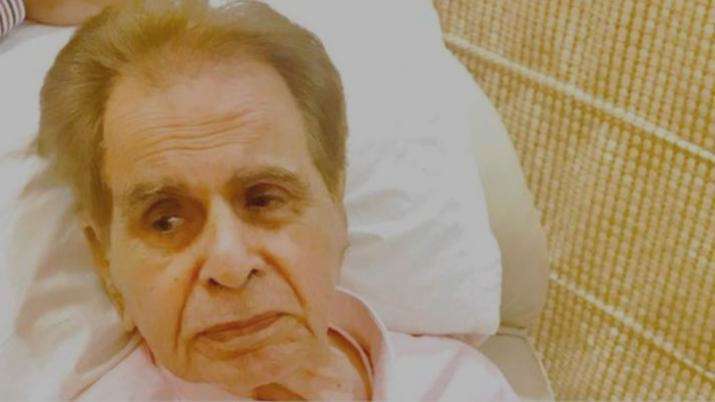On Wednesday, veteran actor Dilip Kumar, 98, breathed his last after prolonged hospitalisation at Mumbai’s PD Hinduja Hospital. The actor was suffering from various age-related ailments. In Bombay of golden era, he was known as a shy Pathan boy from Peshawar. He was practising method acting in Bombay film industry, when Marlon Brando was struggling to find a footing in Hollywood. Dilip Kumar was born on December 11, 1922, one of twelve siblings. He had moved to Mumbai in the late 1930s.
Dilip Kumar was adored by directors of the golden era as the right blend of star and actor. He was able to keep both the public and the intellectuals & purist engaged with his craft, with a dash of finesse. Dilip Kumar was known to keep his performances subtle, understated but always believable.
Various political leaders, movie stars and celebrities across the country took to Twitter to mourn the loss of the iconic veteran actor.
Calling Dilip Kumar “a veritable legend of the silver screen”, Union home minister Amit Shah Shah expressed his grief. He also added that the Indian film industry has lost one of the greatest actors.
Congress leader Rahul Gandhi also expressed his “heartfelt” condolences to Dilip Kumar’s family and friends, adding, “His extraordinary contribution to Indian cinema will be remembered for generations to come.”
Delhi chief minister Arvind Kejriwal called the actor’s passing as an “end of era”. Kejriwal wrote on the micro-blogging site, “Yusuf Sahab’s brilliant acting was like a university in the art world. He will live on in the hearts of all of us. May God place the departed soul at his feet. Humble tribute.”
While the actor was born as Mohammed Yusuf Khan, his screen name was Dilip Kumar. In film industry circles, he was also known as the “first khan” of Bollywood.
Nationalist Congress Party (NCP) chief Sharad Pawar also paid his tributes. He said that he was saddened to hear about the demise of the veteran actor Dilip Kumar. He also added, “We have lost a legend. Deep condolences to the grieving family and fans.”
Aviation minister Hardeep Singh Puri wrote, “Supremely talented and popular, the thespian set the gold standard for the silver screen. Indian cinema has lost an institution of acting. Dilip Saab will continue to live in the hearts of his fans and admirers. Heartfelt condolences to Saira Banu Ji.”
Union minister Jitendra Singh also remembered the Bollywood veteran. Singh said, “We grew up watching his acting, learning his histrionics, emulating his voice modulation.” The union minister further added, “An era closes and so also closes a lasting influence that eternally impacted our boyhood, youth and later years. School of Acting left poorer forever without its greatest maestro.”
Dilip Kumar had helped Bollywood come out of the Parsi theatre’s influence. In the 1940s and 1950s, bollywood was a mix of a little Hollywood, a bit of the Indian epics, a little folk drama with Parsi theatre as a major ingredient of the recipe. Devika Rani of the famed Bombay Talkies had discovered and rechristened Md. Yusuf khan as Dilip Kumar. The troika of Raj Kapoor, Dilip Kumar and Dev anand were the heralds of discovery of Indian cinema. Dilip Kumar’s Peshawar house was declared the national heritage monument on July 13 2014 by Pakistan. He had reportedly once visited his Peshawar house and had kissed the soil remembering his early childhood days.
Dilip Kumar was a multiple-award-winning actor. His career spanned over more than six decades. During the golden era of Hindi cinema, Dilip Kumar charmed millions of hearts with his performance in more than 65 films.
In terms of acting, he had set a template for generations of actors to follow. His standards were use not only by contemporary successors like Manoj Kumar and Dharmendra but also by generations of dependable actors like Amitabh bachchan, Shah Rukh Khan, Irfan Khan and Amir Khan. Numerous actors built edifices of their acting skills on the foundation laid by Dilip Kumar. In the iconic movie Shakti, during the shoot of the dialogues or scenes with Dilip Kumar, Amitabh bachchan reportedly used to get spellbound by his senior’s performance. In the Yash Raj movie Mashaal, Dilip Kumar presented the transition of a man from being an honest journalist to a ruthless Don of Bombay. The movie also starred Anil Kapoor whose character saw a diametrically opposite transition from a street-level goon to a journalist. Dilip Kumar had driven the success of numerous movies during his long career.
To some extent, Dilip Kumar had inspired Meghnad Desai to draw parallels between his films and the newly independent India’s tryst with socialism and capitalism. Desai’s seminal work, Nehru’s Hero: Dilip Kumar in the Life of India, essentially captures these parallels. In those days, it was said that there is a bit of Dilip Kumar in everybody. He was, is and will be known as a cultural icon.





